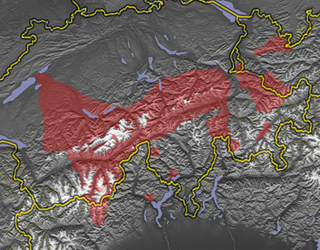Related Research Articles
In grammar, tense is a category that expresses time reference. Tenses are usually manifested by the use of specific forms of verbs, particularly in their conjugation patterns.
French grammar is the set of rules by which the French language creates statements, questions and commands. In many respects, it is quite similar to that of the other Romance languages.
The subjunctive is a grammatical mood, a feature of an utterance that indicates the speaker's attitude toward it. Subjunctive forms of verbs are typically used to express various states of unreality such as wish, emotion, possibility, judgment, opinion, obligation, or action that has not yet occurred; the precise situations in which they are used vary from language to language. The subjunctive is one of the irrealis moods, which refer to what is not necessarily real. It is often contrasted with the indicative, a realis mood which principally indicates that something is a statement of fact.

Verbs constitute one of the main parts of speech in the English language. Like other types of words in the language, English verbs are not heavily inflected. Most combinations of tense, aspect, mood and voice are expressed periphrastically, using constructions with auxiliary verbs.

Spanish verbs form one of the more complex areas of Spanish grammar. Spanish is a relatively synthetic language with a moderate to high degree of inflection, which shows up mostly in Spanish conjugation.
The perfect tense or aspect is a verb form that indicates that an action or circumstance occurred earlier than the time under consideration, often focusing attention on the resulting state rather than on the occurrence itself. An example of a perfect construction is I have made dinner. Although this gives information about a prior action, the focus is likely to be on the present consequences of that action. The word perfect in this sense means "completed".
In Portuguese grammar, nouns, adjectives, pronouns, and articles are moderately inflected: there are two genders and two numbers. The case system of the ancestor language, Latin, has been lost, but personal pronouns are still declined with three main types of forms: subject, object of verb, and object of preposition. Most nouns and many adjectives can take diminutive or augmentative derivational suffixes, and most adjectives can take a so-called "superlative" derivational suffix. Adjectives usually follow their respective nouns.

Walser German and Walliser German are a group of Highest Alemannic dialects spoken in parts of Switzerland, Italy, Liechtenstein, and Austria (Vorarlberg).
In some of the Romance languages the copula, the equivalent of the verb to be in English, is relatively complex compared to its counterparts in other languages. A copula is a word that links the subject of a sentence with a predicate. Whereas English has one main copula verb some Romance languages have more complex forms.
Italian grammar is the body of rules describing the properties of the Italian language. Italian words can be divided into the following lexical categories: articles, nouns, adjectives, pronouns, verbs, adverbs, prepositions, conjunctions, and interjections.
This article describes the grammar of Afrikaans, a language spoken in South Africa and Namibia which originated from 17th century Dutch.
In French, a verb is inflected to reflect its mood and tense, as well as to agree with its subject in person and number. Following the tradition of Latin grammar, the set of inflected forms of a French verb is called the verb's conjugation.
In French grammar, verbs are a part of speech. Each verb lexeme has a collection of finite and non-finite forms in its conjugation scheme.
French conjugation is the variation in the endings of French verbs (inflections) depending on the person, tense and mood. Most verbs are regular and can be entirely determined by their infinitive form, however irregular verbs require the knowledge of more than just the infinitive form, known as the principal parts, of which there are seven in French. With the knowledge of these seven principal parts of a verb, one can conjugate almost all French verbs. However, a handful of verbs, including être, are highly irregular and the seven principal parts are not sufficient to conjugate the verb fully.
This article is an informal outline of the grammar of Interlingua, an international auxiliary language first publicized by IALA. It follows the usage of the original grammar text, which is accepted today but regarded as conservative.
Icelandic is an inflected language. Icelandic nouns can have one of three grammatical genders: masculine, feminine or neuter. Nouns, adjectives and pronouns are declined in four cases and two numbers, singular and plural.
In linguistics, speech or indirect discourse is a grammatical mechanism for reporting the content of another utterance without directly quoting it. For example, the English sentence Jill said she was coming is indirect discourse while Jill said "I'm coming" would be direct discourse. In fiction, the "utterance" might amount to an unvoiced thought that passes through a stream of consciousness, as reported by an omniscient narrator.
This article discusses the conjugation of verbs in a number of varieties of Catalan-Valencian, including Old Catalan. Each verbal form is accompanied by its phonetic transcription. Widely used dialectal forms are included, even if they are not considered standard in either of the written norms: those of the Institut d'Estudis Catalans and the Acadèmia Valenciana de la Llengua. Other dialectal forms exist, including those characteristic of minor dialects such as Ribagorçan and Algherese and transitional forms of major dialects.

Modern standard English has various verb forms, including:
Hindustani verbs conjugate according to mood, tense, person, number, and gender. Hindustani inflection is markedly simpler in comparison to Sanskrit, from which Hindustani has inherited its verbal conjugation system. Aspect-marking participles in Hindustani mark the aspect. Gender is not distinct in the present tense of the indicative mood, but all the participle forms agree with the gender and number of the subject. Verbs agree with the gender of the subject or the object depending on whether the subject pronoun is in the dative or ergative case or the nominative case.